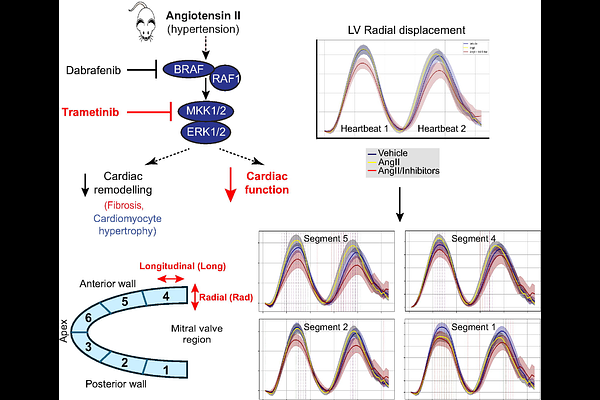The anti-cancer drug trametinib suppresses angiotensin-induced cardiac remodelling in mice but is detrimental to function

The anti-cancer drug trametinib suppresses angiotensin-induced cardiac remodelling in mice but is detrimental to function
Cooper, S. T.; Duvenage, E.; Gattari, D.; Cull, J. J.; Dash, P. R.; Chan, D.; Soria, M. L.; Rossi, M.; Nasuto, S. J.; Holderbaum, W.; Kelion, A.; Sugden, P. H.; Glennon, P. E.; Clerk, A.
AbstractBackground. The anti-cancer MEK inhibitor trametinib (alone or with the RAF inhibitor dabrafenib) causes cardiac dysfunction or heart failure in some patients. Our hypothesis is that cardiotoxicity is exacerbated by an underlying co-morbidity such as hypertension causing early cardiac dysfunction detectable on echocardiograms. Objectives. The objectives were to assess the effects of trametinib on cardiac function in a mouse model of hypertension-induced cardiac hypertrophy and determine if this was moderated by dabrafenib. Methods. Male mice were treated with vehicle, trametinib or dabrafenib/trametinib in the absence/presence of angiotensin II (AngII; 0.8 mg/kg/d to increase blood pressure over 7 d). Hearts were imaged using echocardiography. Results. Inhibitors alone had a limited effect on mouse hearts over 28 d. Trametinib or trametinib/dabrafenib inhibited cardiac hypertrophy induced by AngII over 7 d, reducing left ventricular (LV) wall thickness and mass. AngII did not significantly affect cardiac function, but the inhibitors caused significant functional deterioration. Segmental analysis revealed variation of contraction around the LV, with selective effects of AngII and trametinib or dabrafenib/trametinib in basal/mid-regional segments. Frame-by-frame analysis of radial (not longitudinal) displacement of the LV endocardial wall demonstrated variation between consecutive cardiac cycles that enabled a high degree of classification according to treatment. Conclusions. Trametinib inhibits AngII-induced cardiac hypertrophy in mice but is detrimental to cardiac function, responses that are not moderated by dabrafenib. AngII and MEK/RAF inhibition have regional effects around the LV with greater effects on radial displacement in basal/mid-regional segments. Assessment of such changes may facilitate early identification of developing cardiotoxicity.